How Do Toilets Work in RVs? Types, Pros, Cons, & FAQ
-
Codee Chessher
- Last updated:
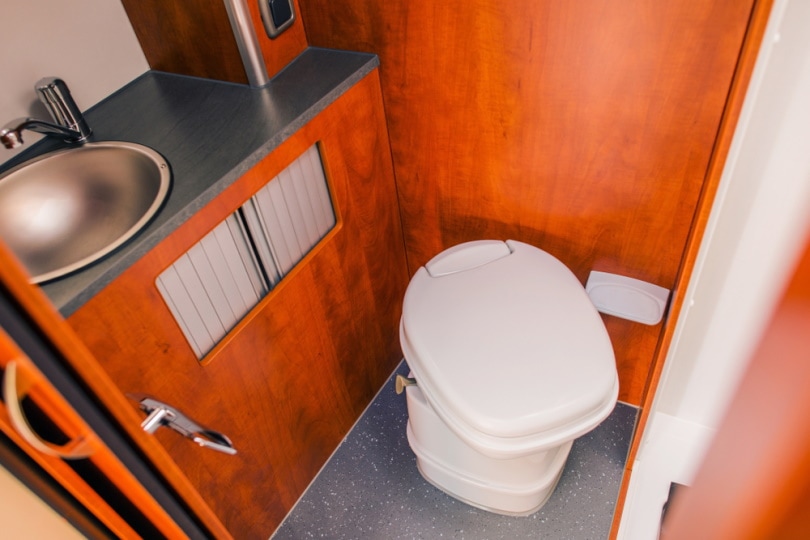
RVs are a popular pastime, but many people are mystified by how they work on a more specific level. For example, how exactly do toilets work in RVs? Can you go number two in an RV toilet? What maintenance is involved? Relax, because in this article we’ll be revealing the mysteries of RV toilets, including precisely what a black tank is and why RVers hate them so much.
Most RV toilets have a small amount of water that stays in the bowl between uses, rather than the half-bowl or more in regular toilets. When you go to the bathroom, you depress the foot pedal, which flushes water into the bowl and washes everything into the blackwater tank. All that separates your toilet from the blackwater tank is a rubber seal, which makes keeping it in good shape imperative. Keep reading as we explain further.
How Do RV Toilets Work?
RVs are recreational vehicles designed to house people while they travel, and camper trailers also share many similarities in form and function. People need to go to the bathroom while they travel, and RVs have special toilets that serve the same purpose as a home toilet.
While home toilets are connected to city water and a drainage system/septic tank, RV toilets have an in-built supply of freshwater and a blackwater tank that stores human waste. They can also usually connect to city water at campgrounds and other special locations.
What happens when your blackwater tank is full? In a lot of cases, it will start backing up into your toilet, signaling that you need to find a campground, rest area, or other designated blackwater disposal site. Most RVers recommend draining the tank whenever it’s more than half or ¾ full to prevent it from backing up because that gets very smelly. However, not all RV toilets work the same, as we’ll soon learn.
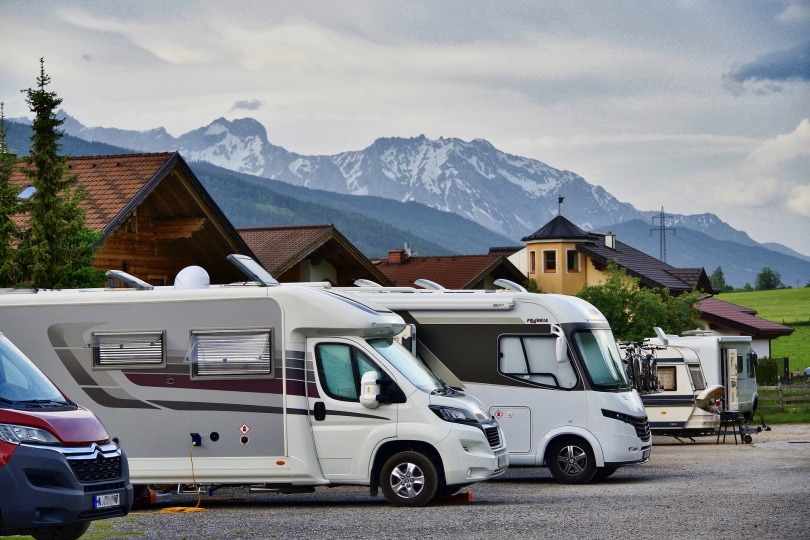
What Are the Different Types of RV Toilets?
Not all RV toilets are created equally. Higher-end RVs often have porcelain toilets, while cheaper plastic toilets are more common in budget RVs and camper trailers. Let’s find out what types of RV toilets there are, how they work, and where you’ll find them.
1. Cassette Toilets
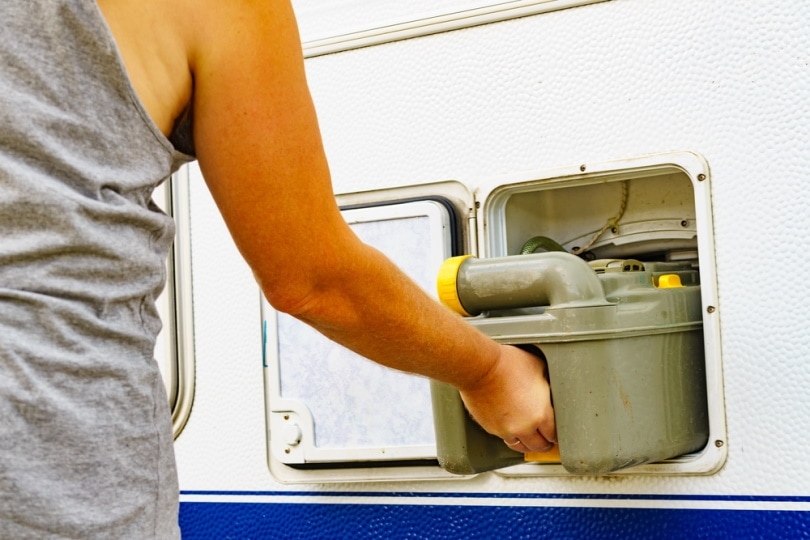
Cassette toilets are common in teardrops, camper trailers, and smaller RVs. They typically have a small freshwater reservoir to flush the toilet into a small portable “cassette,” which can be removed to dump into a septic tank or sewer drain. Cassette toilets aren’t great for long-distance trips because of their low capacity but are usually fine for weekend trips.
2. Gravity Flush Toilets
These are the gold standard in RV toilets, operating much like your toilet at home. Gravity flush toilets operate with a foot pedal or lever that connects to a freshwater tank. When you press the lever or pedal, water flushes in and gravity washes the water and waste into a blackwater tank. Gravity flush toilets come in a wide range of sizes and materials, from small plastic units to the large porcelain thrones you might have at home.
3. Dry Flush Toilets
Dry flush toilets are more economical toilets that don’t rely on freshwater for flushing. They operate much like diaper disposal containers, flushing liquid and solid waste into a bag-like cartridge. Every time you flush, the system twists and forces the waste to the bottom of the cartridge. Every so often, you’ll have to remove, dispose of, and replace the cartridges before they get full.
4. Composting Toilets
Composting toilets are a somewhat expensive and low-capacity way to more efficiently dispose of your waste. It’s not suitable for large groups and is more ideal for single people or couples living in a remote location for a decent period of time. Composting toilets separate liquid and solid waste, diverting the latter to a tank with composting material like sawdust, coconut coir, or peat moss. The toilet doesn’t usually smell foul because the solid waste is converted into compost you can use for gardening.
5. Incinerator Toilets
Incinerator toilets are a more expensive but high-end electric waste disposal system for RVs. These are perfect if you never want to worry about a blackwater tank or even think about toilets. Waste is flushed without water into an incinerator that feeds into an external vent, turning all waste into pure ash.
6. Portable Toilets
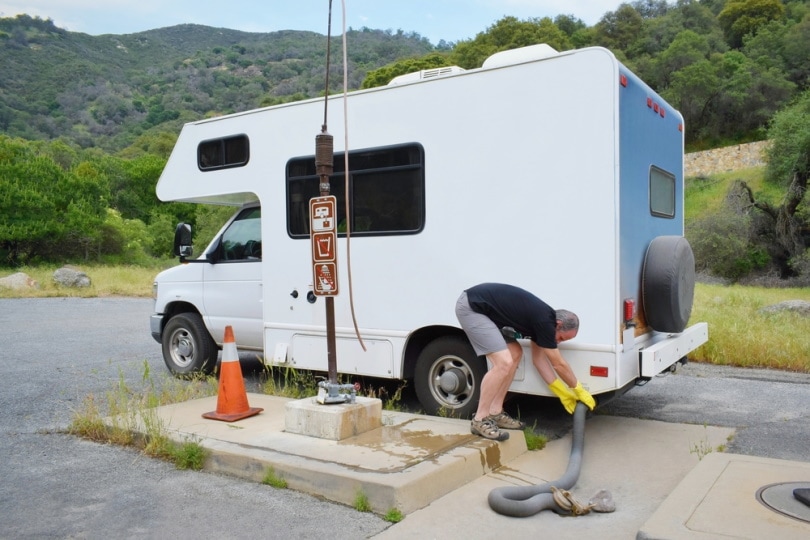
Yep, the good old port-a-potties make an appearance in RVs as well. They’re usually filled partway with a chemical solution to reduce bacteria and smell, but they get smelly anyway. Portable toilets are the cheapest of all RV toilets and have the least setup time but require frequent disposal at gas stations or campgrounds.
7. Vacuum Toilets
Vacuum toilets use a vacuum to flush and have a special macerating pump. The pump shreds all waste into a liquid, which can be pumped farther than regular toilets that have to contend with solid waste. They still use blackwater tanks, but the toilet doesn’t have to be placed on top of it. This affords you greater flexibility in where you can place your toilet in your RV.
Where Are RV Toilets Used?
As the name implies, RV toilets are typically used in RVs. Camper trailers and teardrops usually have smaller, cheaper, and lower-capacity toilets than full-fledged RVs. However, cheap RVs usually have cheap toilets too. Most RVs can be retrofitted with higher-end toilets, while camper trailers are typically limited by small or non-existent blackwater tanks.
RV toilets make it easier to travel long distances or spend time away from civilization. You can spend a weekend at a campground with a cassette toilet or go to far-flung destinations with composting toilets. Incinerator and vacuum toilets give you an easier time dealing with waste while commanding high prices.
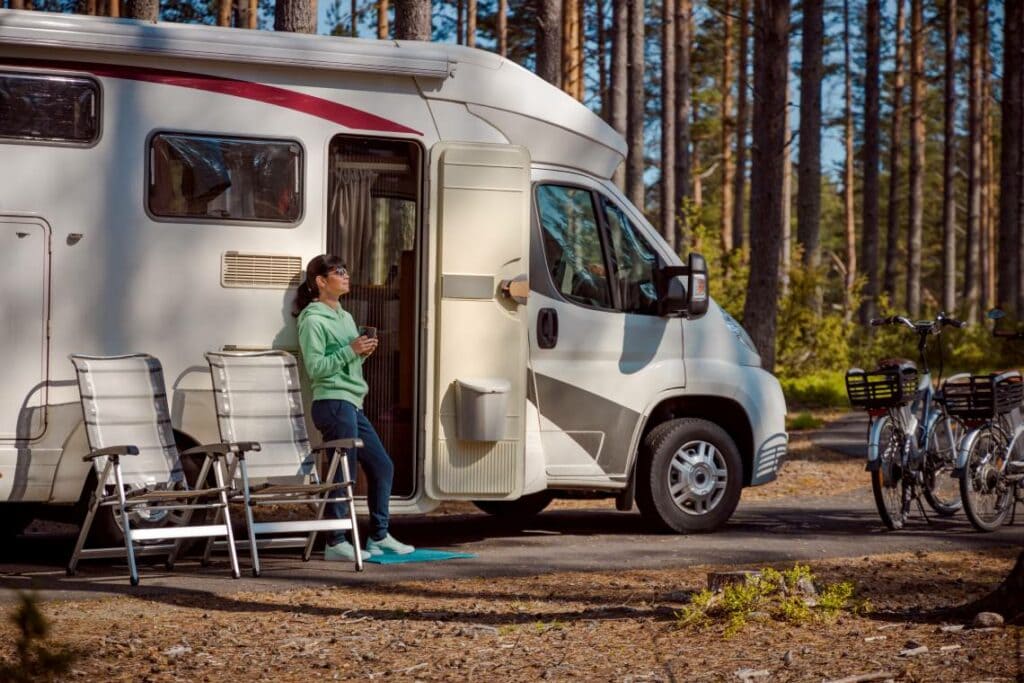
Advantages of RV Toilets
RV toilets are invaluable if you plan to travel, and you should keep in mind how incredibly useful a toilet on the go can be. Let’s check out the pros of RV toilets below.
- As cheap or expensive as you desire
- Even cheap toilets let you go several days without dumping
- Can be retrofitted
- Good quality toilets don’t emanate an odor
- Sanitary to maintain under most circumstances
- All but the cheapest toilets are built to withstand road vibrations
- Lasts a long time when properly maintained
- Some models can completely dispose of waste
Disadvantages of RV Toilets
No matter how useful they are, we must concede that RV toilets have some very notable drawbacks you should be aware of. Let’s check out the most important downsides.
- Can be smelly if neglected
- Rubber seals need maintenance to prevent foul odors and backing up
- Blackwater tanks require special care
- Not all toilet paper is suitable for RV toilets
- Need to dispose of waste periodically
- You must buy a larger capacity toilet for larger groups
- Most toilets require at least minimal maintenance
- Expensive to fix if broken
Frequently Asked Questions
How long do RV toilets last?
Most RV toilets are designed to last at least 10 years if taken good care of. However, toilets need to be thoroughly cleaned and drained after every trip to keep them in good condition. Additionally, rubber seals on toilets with blackwater tanks must be inspected to ensure they stay in good shape.

Do you need special toilet paper for RV toilets?
Yes, you do need quick-dissolving toilet paper for your RV’s toilet. Not all traditional toilet paper breaks down the same when flushed and might clog up your RV’s pipes or blackwater tank. However, regular toilet paper is usually fine for short trips and probably won’t give you any grief. For longer outings, though, you’ll definitely want to find RV-safe or quick-dissolving toilet paper.
Can you interchange RV toilets?
Yes, but it’s not as easy as ripping the old toilet off and putting the new one on. Every RV toilet has its own unique waste disposal system, plus some use pipes and blackwater tanks while others don’t. While you can upgrade your RV’s toilet, your RV will have to be retrofitted with the toilet’s entire disposal system and other mechanisms to work properly.
Conclusion
Toilets in RVs are probably the last thing you want to think about when traveling alone or with the family, but they’re absolutely indispensable. Choosing the right toilet for your needs and keeping up with its required maintenance will keep you happy (and without foul smells) for your entire trip.
Featured Image Credit: Virrage Images, Shutterstock
Contents
